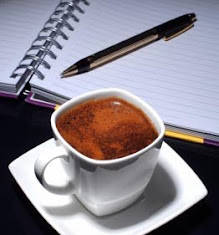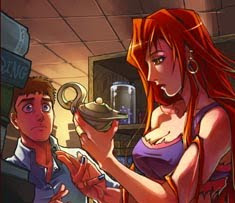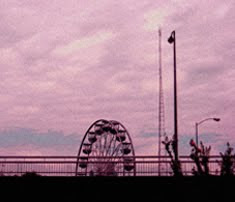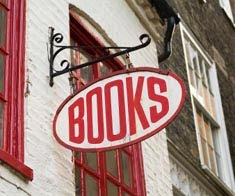My Writings
- Maelstrom at Smashwords
- Maelstrom on Amazon: Maelstrom (print and Kindle)
- My Lulu Store: Ann's Books and Art
- My Scribd Site: Ann's Writings and Collections on Scribd
- Steal Tomorrow for Kindle at Amazon: Steal Tomorrow Kindle Edition
- Steal Tomorrow at Smashwords
- Steal Tomorrow Flash Fiction Collection at Smashwords
- Tin Soldier at Smashwords
About My Artwork
In artwork, In self-publishingOne of the fun things about non-traditional publishing, such as POD and blog fiction, is that you have total control over how you want your writing to look. Weird fonts, colors, pictures, no problem! If you’re in this game for the pleasure of the creative experience, you’re limited by nothing more than your patience and technical expertise.
For my serial blog fiction that later became My New-Found Land, I typically used photographs from my vacations, altered with the “chalk and charcoal” filter in Photoshop. My first attempts were not so good and it sometimes added hours to each night’s post. But after a couple of months I got to where I could turn out a new “drawing” in minutes.
Sometimes the drawings illustrated a story...

And sometimes they were the story.

I also became adept at altering photographs (my own and those given to me by friends), removing and adding things before turning them into charcoal drawings...

or pen and ink...

or into colored pencil or pastel.

Photoshop is maddeningly open-ended in terms of what you can do with it. I’ve barely scratched the surface and even the people in my IT department who are light-years ahead of me are quick to say that they still feel like amateurs, that no one ever really feels like an expert.
This is something all artistic endeavors have in common. There is always more to learn and always a new direction to grow.
For my serial blog fiction that later became My New-Found Land, I typically used photographs from my vacations, altered with the “chalk and charcoal” filter in Photoshop. My first attempts were not so good and it sometimes added hours to each night’s post. But after a couple of months I got to where I could turn out a new “drawing” in minutes.
Sometimes the drawings illustrated a story...

And sometimes they were the story.

I also became adept at altering photographs (my own and those given to me by friends), removing and adding things before turning them into charcoal drawings...

or pen and ink...

or into colored pencil or pastel.

Photoshop is maddeningly open-ended in terms of what you can do with it. I’ve barely scratched the surface and even the people in my IT department who are light-years ahead of me are quick to say that they still feel like amateurs, that no one ever really feels like an expert.
This is something all artistic endeavors have in common. There is always more to learn and always a new direction to grow.
About My Flash Fiction
In flash fiction, In novels, In writingI’ve always been one to write long stories. My childhood writing attempts (never completed) were intended as novels, with my longest taking up more than two hundred pages of college-ruled spiral notebooks before I grew bored and abandoned it.
In college I tried my hand at short stories, but “short” was always a relative term and what I produced was something more akin to novellas. This must have dismayed my creative writing professors, but they were kind about it. It was only much later, after writing four full-length novels, that I began to understand the value of writing short. I tended to ramble in my drafts, leading to months and even years of tightening and cleanup. I needed to find a way to make every word count from the outset.
At first I thought poetry was the answer, but that posed a problem. I don’t enjoy reading other people’s poetry and have even less desire to write or read any of my own.
Then someone on the Absolute Write forum suggested a flash fiction carnival. I was eager to participate, but 1,000 words? Even my shopping lists are longer than that! How could I possibly put a whole story into such a small box?
I mulled over the matter and decided to give it a try. To my surprise, the resulting story wasn’t half bad. It had a clear beginning, middle and end, with a distinct resolution. Comments were favorable and I decided to try again. Soon I was writing a story every week or so, often within the context of my previous dystopian fiction, but branching out from time to time into other genres. It was fun, it was gratifying, and I was learning to say a lot with fewer and fewer words.
Now as I take this skill back into my longer fiction, I find I have a different eye for things. Sentences and entire paragraphs I thought were necessary are expendable. One well-chosen word can take the place of several careless ones.
I’m still learning, still growing into the flash format, but I’m finding that it suits me in ways I had never expected. I started out wanting to improve as a novelist, but I’ve gained a lot more than that. I’ve found a new creative outlet.
In college I tried my hand at short stories, but “short” was always a relative term and what I produced was something more akin to novellas. This must have dismayed my creative writing professors, but they were kind about it. It was only much later, after writing four full-length novels, that I began to understand the value of writing short. I tended to ramble in my drafts, leading to months and even years of tightening and cleanup. I needed to find a way to make every word count from the outset.
At first I thought poetry was the answer, but that posed a problem. I don’t enjoy reading other people’s poetry and have even less desire to write or read any of my own.
Then someone on the Absolute Write forum suggested a flash fiction carnival. I was eager to participate, but 1,000 words? Even my shopping lists are longer than that! How could I possibly put a whole story into such a small box?
I mulled over the matter and decided to give it a try. To my surprise, the resulting story wasn’t half bad. It had a clear beginning, middle and end, with a distinct resolution. Comments were favorable and I decided to try again. Soon I was writing a story every week or so, often within the context of my previous dystopian fiction, but branching out from time to time into other genres. It was fun, it was gratifying, and I was learning to say a lot with fewer and fewer words.
Now as I take this skill back into my longer fiction, I find I have a different eye for things. Sentences and entire paragraphs I thought were necessary are expendable. One well-chosen word can take the place of several careless ones.
I’m still learning, still growing into the flash format, but I’m finding that it suits me in ways I had never expected. I started out wanting to improve as a novelist, but I’ve gained a lot more than that. I’ve found a new creative outlet.
Subscribe to:
Posts (Atom)







